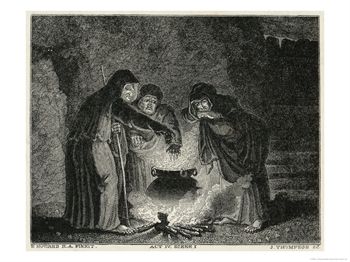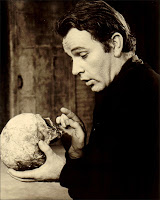2013 was a very big year for Shakespeare in my personal life. I spoke, I wrote, I created, I had an existential crisis, I taught, I saw. Who knows what 2014 will bring? Let’s get started…
 |
| Party on, Shakespeare. |
As loyal readers know, there are always Shakespeare facts, trivia and references flying around my house. Just
search “geeklet” and you’ll see what I’m talking about. Well, in February of this year I learned first hand that everything their geeky dad is telling them doesn’t just go in one ear and out the other in
Geeklet 1, Geek 0.
Then in March I got to scribble “speak publicly, in person, on the subject of Shakespeare” off ye olde bucket list when
Bardfilm asked me to participate in
My First Videoconference with his Modern Shakespearean Fiction class. Thanks KJ!
Then came the bombing of the Boston Marathon. I live about 20 minutes outside of Boston, and knew many people there (thankfully, none of my friends or relatives were injured). Even then were we able to
take comfort in what Shakespeare offered us.
But April is not a time for sadness, it is a time for great joy because another
Shakespeare Day was upon us! Every year I celebrate with my own personal Shakespeare marathon, trying to post more stories in a single day than ever before. This year? 28. That’s more than a story an hour (assuming I didn’t sleep!) And I’ll have you know I don’t cheat and schedule those ahead of time, I monitor and post throughout the day. That’s part of the exhilaration that comes along with it!
This year I also tried something different, something of a “putting other people’s money where my mouth is” campaign, when I launched Shakespeare is Universal. The idea was simple – if you make a real world product, can you get 100 people to buy it? After doing this for eight years I really and truly hoped so. I didn’t let it all ride on some “Prose before Hoes” gimmick, either. I put my faith in a message that I’ve been preaching all this time, and deeply and truly believe.
…and quickly after that to my own personal existential crisis as my deadline approached, I did not hit my goal, and I began to question the whole to blog or not to blog thing in
All Good Things… (which I admittedly stole from the
Star Trek : The Next Generation finale). But! I’m still here, because we did hit our goal, because there are that many people in the world who think that Shakespeare is Universal, and for that I’m eternally grateful. I’m also almost certainly going to make a followup shirt this year, so be prepared 😉
Ok, now back to the good part! As the school year came to a close in June, my perennial attempt to teach Shakespeare to my kids’ elementary school classes paid off double this year. Every year I offer, to every teacher, to bend a Shakespeare lesson into however they think it will fit their curriculum.
For my 10yr old daughter (fifth grade, US) I came in for
Shakespeare Geek Teaches The Sonnets. I thought this would be a fairly dry topic for this age group, but I ended up staying nearly two hours. Brace yourself, that’s a very long post that might well take you as long to read as I did to experience it in the first place.
For my 8 yr old daughter (third grade) I fulfilled a lifelong dream by actually getting the kids out of the seats and reciting the text in
My Directorial Debut! If you thought the last story was long, this story is divided into three parts (
#1,
#2,
#3) This one was particularly special, because after all these years this marked the first time that one of my kids got to “perform” the text, on stage and in front of people:
And now comes the next big highlight of my day, as my daughter wakes from her slumber and begins, “What angel wakes me from my flowery bed? I pray thee, gentle mortal, sing again. Mine ear is much enamour’d of thy note; So is mine eye enthralled to thy shape; I swear, I love thee!”
This marks the first time that one of my children has performed Shakespeare. In public, on a stage, reading original text. I damn near wept. I am thankful that it turned out to be a small part because I think that the longer it went, I might well have exploded. And you know what? She was good. She woke up on cue, and actually got up while reading her lines, which she did not stumble over. Definitely one of my better performers, duly noted for future reference.
Loyal readers may want to go make themselves a snack, maybe do some quick stretches, because we’re only in June here people.
Ok, with July comes Shakespeare on Boston Common! I’ve gone every year for 9 years, the memory of the year I missed Hamlet still haunts me, and 2013 would mark my 10 year anniversary. Even though they were doing Two Gentlemen of Verona (truly one of Shakespeare’s “meh” plays), neither rain not sleet nor snow nor dark of night was about to stop me.
 |
| My son’s favorite Hamlet. |
You know what else fall brings?
Parent Teacher Time once again, and another opportunity to do my volunteer thingie. This time I got two very enthusiastic responses (my oldest daughter has graduated to middle school so her story will come later). I have yet to get into the classroom, but it’s a start!
You know what else else fall brings? Why, a Red Sox / Cardinals World Series, of course! I’m sure you know that your Shakespeare Geek is a Red Sox fan, but did you know that his arch-nemesis Bardfilm is a Cardinals fan? And that the Red Sox / Cardinals have a World Series history? A wager!
There must be a wager of Shakespearean proportion!
 |
| Shakespeare is a David Ortiz fan. |
As the year draws to a close we move on to November and my own “National Novel Writing Month” challenge. The local high school did
Hamlet this year, and I decided there’d be no better time to put words to paper and instead of just explaining the play to my kids before they saw it, I’d write it down. Even better, I’d write it down and then hand it over to my daughter’s middle school teacher, where she’d have her entire class of 11yr olds read it!
Part 1 /
Part 2 /
Part 3 /
Part 4 /
Part 5 / Part 6 (and
my review of the Hamlet, for the curious).
Well, that about wraps it up for the year! Happy Holidays Everyone!






